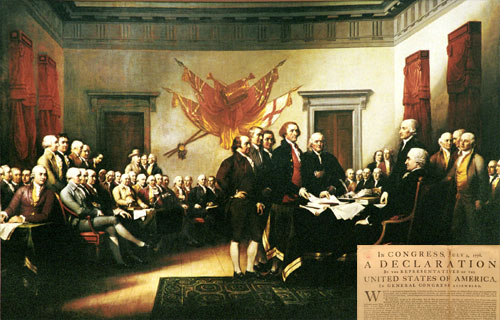|

"We hold these truths to be self-evident,
that all men are created equal,
that they are endowed by their Creator
with certain unalienable Rights,
that among these are Life, Liberty and
the pursuit of Happiness."
The
opening of the Preamble to the United
States Declaration of Independence has
been called "one of the best-known
sentences in the English language", and
for many historical figures, like Abraham
Lincoln and others throughout the world,
it represents the moral standard that
governments should strive to live up to.
The
Declaration of Independence was the document
that declared America's independence from
the British King. What made it a significant
milestone is the reasoning justifying
why the colonies were declaring their
independence. When Thomas Jefferson drafted
the Declaration of Independence, he asserted
ideas influenced by Age of Enlightenment
philosophers like John Locke regarding
'natural rights' and 'natural law.' Natural
rights are universal rights that apply
to everyone, such as the equality of all
people and the right to life, liberty,
and the pursuit of happiness. Natural
rights are not subject to the beliefs,
customs or laws of any particular government
or society. These natural rights then
become the basis for just legal rights
and a system of governance based on a
set of laws that enshrines the natural
rights of all people. Governments gain
their power to rule only by the consent
of the people they govern. This is in
direct contrast to the notion of a King
having power because he is chosen by God.
Because the King denied the American Colonies
their natural rights, they in turn had
the inherent right to revolt.
Today
the concept of natural rights that all
people possess has come to be known as
'human rights' and this concept of inherent
basic rights continues to serve as the
foundation for all visionary blueprints
for creating a more peaceful, just and
sustainable world.
Although
the American Founding Fathers expressed
the ideal that "all men are
created equal", they meant it literally
- women in the new country would not enjoy
equal rights. It also left the concept
of slavery vague and able to be interpreted
as not including slaves, in order to accommodate
the American colonies that allowed slavery.
A century later, Abraham Lincoln however,
would argue for the abolition of slavery
based on the literal expression of this
founding ideal of equality for all.
|